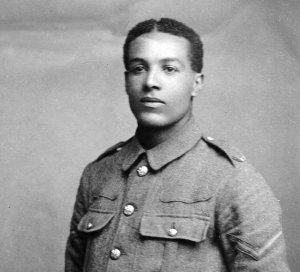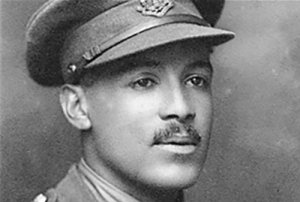Special events are being held this weekend to mark the centenary of the death of First World War hero Walter Tull, whose mother, Alice Palmer, was born in Dover.
Walter lived in Folkestone as a boy and went on to become the first black professional outfield football player in Britain and the first Black British army officer.
Several relatives still live in Dover, Folkestone and Maidstone and they will be among those attending events to mark 100 years since he was killed by a German sniper during the second battle of the Somme on 25 March 1918. He was just 29 years old.
Orphaned when he was nine, Walter and his brother went into a National Children's Home at Bethnal Green which is where Walter became interested in football.
He played for Clapton and signed for Tottenham Hotspur in 1909, suffering racial abuse along the way. By 1911, he was playing for Northampton and when war broke out, he enlisted in the Football Battalion of the Middlesex Regiment.
On Saturday a memorial service will be held at a statue to Walter Tull in Northampton, followed by talks about him, and about racism in sport.
On Sunday, a blue plaque is being unveiled on a house where he lived in Queen Street, Rushden, near Northampton.
Plaques are already in place on Mundella School in Folkestone, formerly the North Board School which Walter attended as a boy, and on the bandstand at The Leas, Folkestone. Walter is remembered on the war memorials in Dover, River and Folkestone, and at Cheriton Cemetery in Folkestone where his parents and other members of the family are buried. Walter's body was never recovered from the battlefield.
A National Lottery grant has been given towards a project called Tull 100 to remember Walter Tull and stand up against discrimination. Groups throughout the UK can take part in a No Barriers challenge with commemorative medals being awarded to those who make their communities more inclusive.
Tull100 is funded by Ministry of Housing, Communities and Local Government.
Communities Minister Lord Bourne said: "Walter Tull is a true British hero, who went to great lengths to overcome the barriers of class and colour to fight for his country. Tull 100 is an excellent opportunity for all of us to learn more about his courageous actions in the First World War and his extraordinary football career.
"This ambitious project will also hold a mirror to our times, allowing young people to see how far we have come and ensure progress continues in creating a society where everyone, regardless of background, can reach their full potential."



